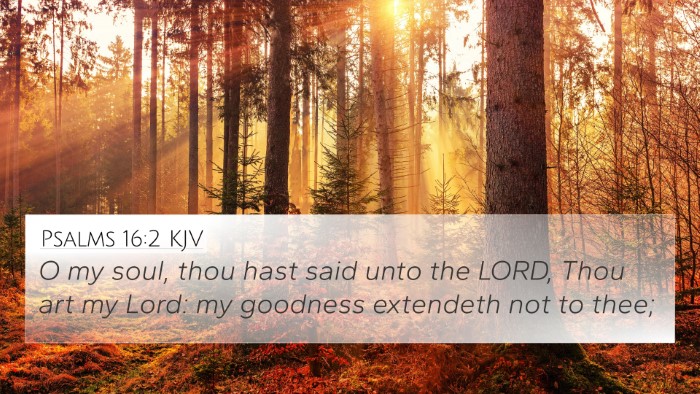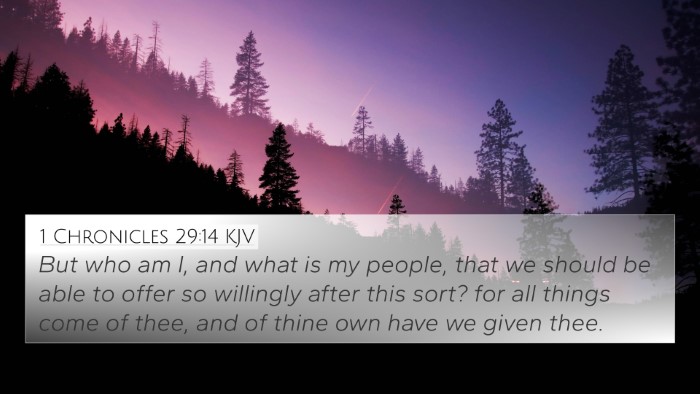Old Testament
Genesis Exodus Leviticus Numbers Deuteronomy Joshua Judges Ruth 1 Samuel 2 Samuel 1 Kings 2 Kings 1 Chronicles 2 Chronicles Ezra Nehemiah Esther Job Psalms Proverbs Ecclesiastes Song of Solomon Isaiah Jeremiah Lamentations Ezekiel Daniel Hosea Joel Amos Obadiah Jonah Micah Nahum Habakkuk Zephaniah Haggai Zechariah MalachiJob 35:7 Similar Verses
Job 35:7 Cross References
If thou be righteous, what givest thou him? or what receiveth he of thine hand?
Uncover the Rich Themes and Topics of This Bible Verse
Listed below are the Bible themes associated with Job 35:7. We invite you to explore each theme to gain deeper insights into the Scriptures.
Job 35:7 Cross Reference Verses
This section features a detailed cross-reference designed to enrich your understanding of the Scriptures. Below, you will find carefully selected verses that echo the themes and teachings related to Job 35:7 KJV. Click on any image to explore detailed analyses of related Bible verses and uncover deeper theological insights.

Job 22:2 (KJV) »
Can a man be profitable unto God, as he that is wise may be profitable unto himself?

Psalms 16:2 (KJV) »
O my soul, thou hast said unto the LORD, Thou art my Lord: my goodness extendeth not to thee;

Proverbs 9:12 (KJV) »
If thou be wise, thou shalt be wise for thyself: but if thou scornest, thou alone shalt bear it.

Luke 17:10 (KJV) »
So likewise ye, when ye shall have done all those things which are commanded you, say, We are unprofitable servants: we have done that which was our duty to do.

1 Chronicles 29:14 (KJV) »
But who am I, and what is my people, that we should be able to offer so willingly after this sort? for all things come of thee, and of thine own have we given thee.
Job 35:7 Verse Analysis and Similar Verses
Understanding Job 35:7
Job 35:7 states, “If you are righteous, what do you give to Him? Or what does He receive from your hand?” This verse, spoken by Elihu, compels us to examine the nature of human righteousness in relation to God.
Summary of Insights
This verse prompts us to reflect on the significance of our deeds before God. Public domain commentaries like Matthew Henry, Albert Barnes, and Adam Clarke provide valuable interpretations.
Matthew Henry’s Commentary
Matthew Henry emphasizes that our attempts to justify ourselves before God are futile, as God's greatness outstrips any human merit. He asserts that righteousness does not add to God's glory nor diminish it.
Albert Barnes’ Commentary
Albert Barnes explains that Elihu’s inquiry highlights that our moral conduct does not influence God’s essence or needs. Our righteousness does not enhance God's character; instead, our actions are for our benefit, not God's.
Adam Clarke’s Commentary
Adam Clarke notes that the essence of the verse prompts believers to recognize that God’s relationship with humanity doesn’t rely on human righteousness but rather on God’s grace and mercy.
Major Themes
- The Nature of Righteousness: Job 35:7 raises questions on the true value of human righteousness.
- Divine Sovereignty: The verse underscores God's independence from human merits.
- Human Dependency: It highlights our reliance on God's grace rather than our actions.
Cross-Referenced Verses
- Job 22:2-4: Addresses the concept of what can be given to God in exchange for righteousness.
- Psalm 16:2: “You are my Lord; apart from you I have no good thing,” which reflects the dependence on God.
- Romans 3:20: States that no one will be declared righteous by the works of the Law, supporting the theme of grace over merit.
- Isaiah 64:6: “All of us have become like one who is unclean, and all our righteous acts are like filthy rags,” emphasizing the insufficiency of human righteousness.
- Isaiah 40:15: Depicts the greatness of God and the insignificance of nations, illustrating God's self-sufficiency.
- Ephesians 2:8-9: Highlights salvation by grace through faith, not by works.
- Philippians 3:9: Explains the righteousness that comes from faith in Christ, rather than from the Law.
Application and Reflection
This verse and its commentaries encourage believers to aim for humility in their spiritual journey. It serves as a reminder that our relationship with God is predicated on His grace, rather than our achievements or righteousness.
Cross-Referencing Insights
For those interested in cross-referencing Biblical texts, the exploration of this verse opens up pathways for a deeper understanding of the nature of God and humanity. Utilizing a Bible concordance or a cross-reference Bible study guide can be instrumental in finding connections.
Tools for Bible Cross-Referencing
- Bible Concordance: A useful tool for hunters of connections and cross-references.
- Online Bible Study Platforms: Many offer comprehensive cross-reference materials to enhance study.
- Study Bibles: Often include cross-references in the margins for deeper insights.
Conclusion
Job 35:7, in light of comprehensive analysis from various commentaries, invites believers to contemplate the deep relational dynamics with God where human righteousness holds no weight in God’s vast and sovereign plan.



